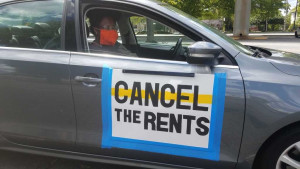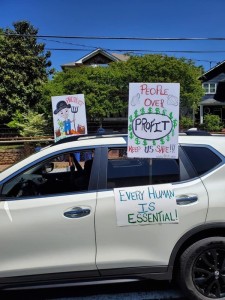Activists Call for Rental Moratorium as Eviction Crisis Looms
Photographs one and three of three courtesy of United Student Workers of Georgia. Photograph two courtesy of the Party for Socialism and Liberation.
(APN) ATLANTA — With millions of people in the U.S. out of work as a result of COVID-19 and the various government orders shuttering society and most businesses, there is a brewing residential rental crisis threatening to cause a homelessness crisis in the near future.
The crisis has been kept at bay by various emergency court orders and executive orders suspending evictions.
However, none of these orders have waived rental payments; the ability to evict someone for nonpayment is merely deferred.
In other words, many low-income families may find they have accrued anywhere between one to three months of past due rent.
Working families in this country, of course, tend already to be severely housing cost-burdened and often with little to no savings with which to weather an emergency.
 According to a survey conducted by Apartment List, 31 percent of respondents had not fully made their monthly housing payment, whether a rental payment or a mortgage payment, during the first week of May 2020.
According to a survey conducted by Apartment List, 31 percent of respondents had not fully made their monthly housing payment, whether a rental payment or a mortgage payment, during the first week of May 2020.
GEORGIA HAS DONE LITTLE TO PROTECT TENANTS
“Georgia has not implemented statewide orders that would prevent evictions during and immediately following the pandemic,” according to EvictionLab, a group of researchers and students at Princeton University.
https://evictionlab.org/covid-policy-scorecard/ga/
“The Georgia Supreme Court… has directed courts to prioritize essential functions–but leaves it up to courts to decide whether eviction cases should be considered ‘essential,’” the EvictionLab report states.
 “Without action and supportive measures, Georgia could see a surge of evictions during and immediately following the pandemic,” the report states.
“Without action and supportive measures, Georgia could see a surge of evictions during and immediately following the pandemic,” the report states.
As per Fulton County Magistrate Court Chief Judge Cassandra Kirk’s most recent “Fourth Amended Order” issued on May 21, 2020, tenant-landlord hearings are still on hold, but the Court is prioritizing tenant-landlord mediation to begin on June 22, 2020.
DeKalb County Magistrate Court Chief Judge Asha Jackson has ordered all non-essential matters on hold until June 12, 2020.
There seems to be significant variation from county to county in Georgia, with some Metro Atlanta counties saying in late March 2020 that they were reserving the right to process tenant evictions on a case-by-case basis, according to 11 Alive television news.
Some residential lessors have already filed dispossessory actions against their tenants for nonpayment, and the actions are currently pending until such time that Georgia’s counties begin processing residential dispossessory actions again.
The only statewide relief in Georgia applies to residential tenants of certain subsidized housing properties.
The Coronavirus Aid, Relief, and Economic Security Act (“CARES Act”) includes an eviction moratorium on rental housing properties receiving any type of federal assistance.
Accordingly, Chief Justice Harold R. Melton of the Supreme Court of Georgia issued an order on April 30, 2020, approving a new “Uniform Magistrate Court Rule 46,” which stipulates:
“A landlord who files a dispossessory before August 25, 2020 under OCGA § 44-7-50 (a) seeking possession of a residential premises for nonpayment of rent shall submit verification… indicating whether the property is exempt from the moratorium provided for in the …CARES Act,” the new Rule 46 states.
A “covered property” under the CARES ACT is prohibited from filing a thirty day notice of eviction until July 26, 2020.
CALLS FOR RENTAL FORGIVENESS
Numerous progressive organizations in Atlanta held a “car protest” on May 01, 2020 calling for a moratorium on rent.
Bekah Ward of United Campus Workers of Georgia said she knows several people who have fallen behind on rent during COVID-19.
“Some of them are actually workers on campuses. The student workers who were part-time were all let go when the campuses were shut down. Two of them I know are behind on rent right now. One of them is a lab technician, one was a cafeteria worker,” Ward told Atlanta Progressive News.
She said a third campus worker she knows has paid March, April, and May rent, but will be unable to pay June.
The twelve-hundred dollar relief checks that most in the U.S. have received have barely helped to cover COVID-related expenses.
“Other expenses also eat up that money. Expenses related to daily life under COVID, or taking care of younger relatives. Our disruption is massive, and 1,200 dollars isn’t sufficient,” Ward said.
“And the back rent will be due. And so for people who are not being evicted and are in arrears, they are going to have to have all of the money. There’s no way to do that when you’re unemployed,” Ward said.
Organizations including Housing Justice League, United Campus Workers of Georgia, Georgia STAND UP, and others have called for an eviction moratorium.
“For the duration of the COVID crisis, no rent would be charged,” Ward says of the groups’ demand.
“The states can subsidize the landlords to maintain their ability to keep their properties, and all that really has to happen is a restart button when the COVID crisis ends.” Ward said.
“It would require some federal money. Or, if we’re talking a few more months, they could pass laws to get enough money from corporate taxes and high income earners in Georgia,” Ward said.
Given the budget shortfalls based by all U.S. states, “everyone will have to raise taxes now. We can remain competitive and still make corporations pay their fair share,” Ward said.
As previously reported by APN, the Party for Socialism and Liberation also held a protest calling for a moratorium on rents on April 24, 2020.
“The patchwork of city and state moratoriums on evictions are not enough,” their organization said in a press release.
(END / Copyright Atlanta Progressive News / 2020)
